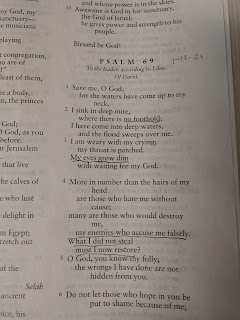Observation: After an intense period of healing many people and casting out many unclean spirits, Jesus realizes he may be God's Son, but he still can't do this work alone. So he calls a group of people together who we called "apostles" (which is Greek for "one who is sent"). The plan of action is pretty clear cut. First, just be with him. Second, go and proclaim Jesus' message about the nearness of God's kingdom. Third, by Jesus' authority, cast out demons.
Application: I've been thinking a lot about "unclean spirits", or demons, lately, because our gospel text for Sunday features Jesus' first exorcism. I myself have never seen an exorcism, and in the Christian tradition in which I was raised, they are not common (except when we renounce evil before baptism). That doesn't mean they don't exist. I think they do, and Christians in other parts of the world agree.
But what I have experienced is that when we do what apostles do, evil tends to show up, both within us and around us. If we take Jesus' invitation to be with him, we won't be alone. Our selfish thoughts, our proud ambitions, and our deep insecurities will tag along. And if we spend enough time with Jesus so we actually start to understand and share his message with others, we won't be alone then, either. We will be challenged. And if we are really honest and forthright with Jesus' message and how it disrupts the status quo--empowering those with no power, declaring forgiveness and acceptance to those left out in the cold, healing us from dependence on unhealthy systems, both in families and in society--in all likelihood, we will see demons. But if we have followed steps 1 and 2, by the time we get to step 3, casting out demons, we will already have the authority of Jesus to do what we need to do. It will probably be a much slower, less dramatic, less action-packed battle than we find in the gospels. But one day, we will wake up and notice that the voices that plagued us, that threatened us with harm, that vowed our destruction, have fallen silent. And the cycle begins again. To be with Jesus, to be sent by him, to proclaim his message, and to do battle once again.
Prayer: Jesus, help me with step #1 today. Help me be with you, and we'll go from there. Amen.










